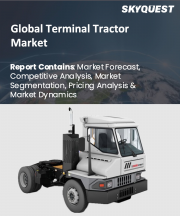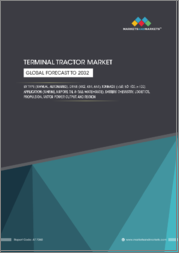
|
시장보고서
상품코드
1505192
터미널 트랙터 시장(2024-2031년)Global Terminal Tractor Market 2024-2031 |
||||||
터미널 트랙터 시장은 예측 기간(2024-2031년)에 CAGR 5.2%로 성장할 것으로 예측됩니다. 터미널 트랙터는 배송장, 창고, 복합 운송 시설과 같은 제한된 공간에서 사용되는 특수 운반 차량입니다. 1인용 운전석, 풀 리어 도어, 짧은 휠베이스, 저출력 엔진, 5륜 커플링을 갖추고 있습니다. 바쁜 운송 항구, 창고, 물류센터, 복합 운송 시설, 제조 공장에서 컨테이너를 이동하는 데 사용됩니다. 기동성, 효율성, 비용 효율성, 다용도성 등의 장점이 있습니다.
시장 역학
세계 무역과 E-Commerce의 확대
각국의 화물 운송량이 증가함에 따라 공항과 항구는 터미널의 처리 능력을 향상시키기 위해 시설을 업그레이드해야 합니다. 터미널 트랙터는 이러한 시설에서 트레일러와 컨테이너를 이동시키는 데 중요한 역할을 하고 있으며, 무역 활동이 증가함에 따라 더 많은 트랙터가 필요합니다. 따라서 주요 투자자들은 터미널 트랙터 스타트업에 투자하여 첨단 터미널 트랙터 생산을 늘리고 있습니다. 예를 들어 2023년 1월, 자율주행 야드 트럭을 개발하는 스타트업 아웃라이더 테크놀러지스(Outrider Technologies Inc.)는 FM 캐피탈이 주도하는 시리즈 C에서 7,300만 달러의 자금을 확보했습니다. 콜로라도 주 골든에 본사를 둔 아웃라이더의 전기 야드 트럭은 온보드 내비게이션 소프트웨어와 로봇 팔을 사용하여 브레이크 라인과 전기 라인을 자동으로 연결하고 트레일러를 주차장에서 하역장까지 자율적으로 견인합니다. 아웃라이더의 클라우드 기반 물류 플랫폼인 미션 컨트롤(Mission Control)이 트레일러의 움직임을 조정합니다.
물류업계의 자동화 발전
자동화는 물류업계의 큰 흐름이며, 터미널 트랙터도 예외는 아닙니다. 각 제조업체는 운전자 없이도 운전할 수 있는 자율형 터미널 트랙터를 개발하고 있습니다. 이는 터미널의 효율성과 안전성을 향상시킬 수 있으며 향후 수년간 시장 성장의 주요 원동력이 될 것으로 보입니다. 예를 들어 2022년 8월 Taylor Group of Companies와 Royal Terberg Group이 공동으로 설립한 Terberg Taylor Americas Group, LLC는 미시시피 주에 2,000만 달러를 투자하여 제조 시설을 설립했습니다. 이 벤처기업은 테르베르그의 터미널 트랙터를 제조, 판매 및 임대하는 것을 목표로 하고 있으며, 첫 번째 트랙터는 2024년 중반까지 출시될 예정입니다. 이 두 가족 기업 간의 성공적인 파트너십을 활용하여 Terberg Taylor Americas Group은 생산 수요를 충족시키기 위해 확장 가능한 설계를 활용하고 고객의 사양에 따라 다양한 Terberg 모델을 사용자 정의할 것입니다.
시장 세분화
상당한 시장 점유율을 차지하고 있는 자율주행차 하위 부문
터미널 트랙터의 자동화 하위 부문은 효율성 향상, 안전성, 비용 절감 등의 장점으로 인해 큰 시장 점유율을 차지할 수 있습니다. 자동화된 트랙터는 24시간 365일 쉬지 않고 작동할 수 있으므로 처리 시간을 단축하고 운영 효율성을 향상시킬 수 있습니다. 자동화 시스템은 운영 수요에 따라 쉽게 확장하거나 축소할 수 있습니다. 그럼에도 불구하고, 자동화의 장기적인 이점은 설득력이 있으며, 이는 조기 채택과 시장 점유율 확대로 이어집니다.
지역별 전망
세계 터미널 트랙터 시장은 북미(미국, 캐나다), 유럽(영국, 이탈리아, 스페인, 독일, 프랑스, 기타 유럽), 아시아태평양(인도, 중국, 일본, 한국, 기타 아시아태평양), 기타 지역(중동 및 아프리카, 라틴아메리카)으로 세분화되어 있습니다. 지역별로 더욱 세분화됩니다.
아시아태평양이 주요 시장 점유율을 차지합니다.
아시아태평양은 전 세계 터미널 트랙터 시장에서 큰 비중을 차지하고 있습니다. 급속한 도시화와 E-Commerce 분야의 성장에 따른 효율적인 화물 이동에 대한 수요 증가가 이 지역 시장의 높은 점유율의 주요 요인으로 작용하고 있습니다. 신흥 경제국들은 무역 호황을 경험하고 있으며, 강력한 물류 인프라를 필요로 하고 있습니다. 주요 제조 거점들은 효율적인 인트라 물류 솔루션을 필요로 하고 있습니다. 정부 구상은 자동화 및 인프라 개발을 촉진하고 현대식 터미널 트랙터에 대한 투자를 증가시킬 것입니다.
세계 터미널 트랙터 시장에 진출한 주요 기업으로는 Cargotech Corp. 등이 있습니다. 시장 경쟁력을 유지하기 위해 시장 기업은 제휴, 합병, 인수 등의 전략을 적용하여 사업 확장 및 제품 개발에 점점 더 많은 노력을 기울이고 있습니다.
목차
제1장 리포트 개요
- 업계 현황 분석과 성장 가능성 전망
- 조사 방법과 툴
- 시장 내역
- 부문별
- 지역별
제2장 시장 개요와 인사이트
- 조사 범위
- 애널리스트 인사이트와 현재 시장 동향
- 주요 업계 동향
- 시장 권장사항
- 결론
제3장 경쟁 구도
- 주요 기업 분석
- Cargotec Corp.(Kalmar)
- 개요
- 재무 분석
- SWOT 분석
- 최근 동향
- Konecranes Oyj
- 회사 개요
- 재무 분석
- SWOT 분석
- 최근 동향
- Sany Group
- 개요
- 재무 분석
- SWOT 분석
- 최근 동향
- 주요 전략 분석
제4장 시장 세분화
- 세계의 터미널 트랙터 시장 : 추진별
- 디젤
- 전기
- 기타(하이브리드/CNG)
- 세계의 터미널 트랙터 시장 : 용도별
- 항만 터미널
- 물류센터
- 창고
- 기타(제조·유틸리티)
- 세계의 터미널 트랙터 시장 : 차종별
- 수동식
- 자동화
제5장 지역별 분석
- 북미
- 미국
- 캐나다
- 유럽
- 영국
- 독일
- 이탈리아
- 스페인
- 프랑스
- 기타 유럽
- 아시아태평양
- 중국
- 인도
- 일본
- 한국
- 기타 아시아태평양
- 세계의 기타 지역
- 라틴아메리카
- 중동 및 아프리카
제6장 기업 개요
- Autocar, Inc.
- Capacity Trucks, Inc.
- CVS Ferrari SPA GmbH
- Gaussin
- Hyster-Yale Materials Handling, Inc.
- Liebherr Group
- Linde PLC
- MAFI Transport-System
- Mol CY
- Outrider Technologies, Inc.
- Terberg Group BV
- TICO Tractors
- Volvo AB
- Wiese USA
Terminal Tractor Market Size, Share & Trends Analysis Report by Propulsion (Diesel, Electric, and Others), by Application (Port Terminal, Distribution Centers, Warehouse, and Others), and by Vehicle Type (Manual, and Automated) Forecast Period (2024-2031)
Terminal tractor market is anticipated to grow at a CAGR of 5.2% during the forecast period (2024-2031). Terminal tractors are specialized hauling vehicles used in confined spaces such as shipping yards, warehouses, and intermodal facilities. They have a single-person cab, a full rear door, a short wheelbase, low-power engines, and a fifth-wheel coupling. They are used in busy shipping ports, warehouses, distribution centers, intermodal facilities, and manufacturing plants for moving containers. Benefits include maneuverability, efficiency, cost-effectiveness, and versatility.
Market Dynamics
Growing global trade and e-commerce sector
As the volume of cargo shipments increases across countries, airports, and seaports will need to upgrade their equipment to improve terminal throughput. Terminal tractors play a vital role in moving trailers and containers around these facilities, and an increase in trade activity will necessitate more of them. Therefore, key investors are investing in terminal tractor startups to increase the production of advanced terminal tractors. For instance, in January 2023, Outrider Technologies Inc., a startup developing autonomous yard trucks, secured $73.0 million in Series C funding led by FM Capital. Based in Golden, Colorado, Outrider's electric yard trucks autonomously tow trailers from parking areas to loading docks using onboard navigation software and robotic arms to connect brake and electric lines automatically. The company's cloud-based logistics platform, Mission Control, coordinates trailer movements.
Increased automation in the logistics industry
Automation is a major trend in the logistics industry, and terminal tractors are no exception. Manufacturers are developing autonomous terminal tractors that can operate without a human driver. This can improve efficiency and safety in terminals, and it is likely to be a major driver of growth in the market in the coming years. For instance, in August 2022, Terberg Taylor Americas Group, LLC, a collaboration between Taylor Group of Companies and Royal Terberg Group, established a manufacturing facility in Mississippi with a USD 20 million investment. This venture aims to build, sell, and rent Terberg terminal tractors, with the first tractor expected to roll out by mid-2024. Leveraging the successful partnership between the two family-owned businesses, Terberg Taylor Americas Group will utilize scalable designs to meet production demands and customize various Terberg models according to customer specifications.
Market Segmentation
- Based on propulsion, the market is segmented into diesel, electric, and other including hybrid and CNG.
- Based on application, the market is segmented into port terminals, distribution centers, warehouses, and others including manufacturing and utilities.
- Based on vehicle type, the market is bifurcated into manual and automated.
Automated Vehicle Sub-segment to Hold a Considerable Market Share
The automated sub-segment in terminal tractors has the potential to hold a significant market share due to its advantages such as increased efficiency, safety, and cost reduction. Automated tractors can operate 24/7 without breaks, leading to faster turnaround times and improved operational efficiency. Automated systems can be easily scaled up or down to meet operational demands. Despite these, the long-term benefits of automation are compelling, leading to early adopters and increased market share.
Regional Outlook
The global terminal tractor market is further segmented based on geography including North America (the US, and Canada), Europe (UK, Italy, Spain, Germany, France, and the Rest of Europe), Asia-Pacific (India, China, Japan, South Korea, and Rest of Asia-Pacific), and the Rest of the World (the Middle East & Africa, and Latin America).
Asia-Pacific Holds Major Market Share
Asia-Pacific holds a major share of the global terminal tractor market. The rapid urbanization and increasing demand for efficient cargo movement with the growing e-commerce sector are key contributors to the high share of the regional market. Developing economies are experiencing a boom in trade, requiring robust logistics infrastructure. Major manufacturing hubs require efficient intra-logistics solutions. Government initiatives promote automation and infrastructure development, leading to increased investment in modern terminal tractors.
The major companies serving the global terminal tractor market include Cargotech Corp. (Kalmar), Konecranes Oyj, Sany Group, Terberg Group BV, and Hyster-Yale Materials Handling, Inc. among others. The market players are increasingly focusing on business expansion and product development by applying strategies such as collaborations, mergers, and acquisitions to stay competitive in the market.
Table of Contents
1. Report Summary
- Current Industry Analysis and Growth Potential Outlook
- 1.1. Research Methods and Tools
- 1.2. Market Breakdown
- 1.2.1. By Segments
- 1.2.2. By Region
2. Market Overview and Insights
- 2.1. Scope of the Report
- 2.2. Analyst Insight & Current Market Trends
- 2.2.1. Key Industry Trends
- 2.2.2. Market Recommendations
- 2.2.3. Conclusion
3. Competitive Landscape
- 3.1. Key Company Analysis
- 3.2. Cargotec Corp. (Kalmar)
- 3.2.1. Overview
- 3.2.2. Financial Analysis
- 3.2.3. SWOT Analysis
- 3.2.4. Recent Developments
- 3.3. Konecranes Oyj
- 3.3.1. Overview
- 3.3.2. Financial Analysis
- 3.3.3. SWOT Analysis
- 3.3.4. Recent Developments
- 3.4. Sany Group
- 3.4.1. Overview
- 3.4.2. Financial Analysis
- 3.4.3. SWOT Analysis
- 3.4.4. Recent Developments
- 3.5. Key Strategy Analysis
4. Market Segmentation
- 4.1. Global Terminal Tractor Market by Propulsion
- 4.1.1. Diesel
- 4.1.2. Electric
- 4.1.3. Others (Hybrid/CNG)
- 4.2. Global Terminal Tractor Market by Application
- 4.2.1. Port Terminal
- 4.2.2. Distribution Centers
- 4.2.3. Warehouse
- 4.2.4. Others (Manufacturing and Utilities)
- 4.3. Global Terminal Tractor Market by Vehicle Type
- 4.4.1 Manual
- 4.4.2 Automated
5. Regional Analysis
- 5.1. North America
- 5.1.1. United States
- 5.1.2. Canada
- 5.2. Europe
- 5.2.1. UK
- 5.2.2. Germany
- 5.2.3. Italy
- 5.2.4. Spain
- 5.2.5. France
- 5.2.6. Rest of Europe
- 5.3. Asia-Pacific
- 5.3.1. China
- 5.3.2. India
- 5.3.3. Japan
- 5.3.4. South Korea
- 5.3.5. Rest of Asia-Pacific
- 5.4. Rest of the World
- 5.4.1. Latin America
- 5.4.2. Middle East & Africa
6. Company Profiles
- 6.1. Autocar, Inc.
- 6.2. Capacity Trucks, Inc.
- 6.3. CVS Ferrari SPA GmbH
- 6.4. Gaussin
- 6.5. Hyster-Yale Materials Handling, Inc.
- 6.6. Liebherr Group
- 6.7. Linde PLC
- 6.8. MAFI Transport-System
- 6.9. Mol CY
- 6.10. Outrider Technologies, Inc.
- 6.11. Terberg Group BV
- 6.12. TICO Tractors
- 6.13. Volvo AB
- 6.14. Wiese USA



















